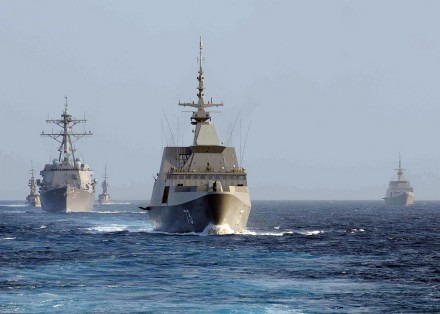 I've known Doug Paal for many years now (going back to my early Naval War College days), and he's an eminently sensible fellow with a huge background in Chinese affairs.
I've known Doug Paal for many years now (going back to my early Naval War College days), and he's an eminently sensible fellow with a huge background in Chinese affairs.
Some key bits from a Diplomat piece just published:
The South China Sea presents complicated issues of evolving international law, historic but ill-defined claims, a rush to grab declining fish stocks, and competition to tap oil and gas reserves. Beijing’s much discussed “nine-dashed line,” that purports to give China a claim on about 80 percent of the South China Sea and its territories, used to be an eleven-dashed line. Two dashes separating Chinese and Vietnamese claims were resolved through bilateral negotiations years ago. This suggests that the remaining nine dashes are equally negotiable. But China rigidly refuses to clarify the basis for its claims, whether they are based on the accepted international law of the United Nations Convention on the Law of the Sea (UNCLOS) or the less widely accepted historical assertions. Beijing’s refusal to choose suggests it wants to maximize its legal and political leverage, even as the growth of its military and maritime assets gains physical leverage over its weaker neighbors.
Beijing is not alone. Hanoi has leased oil exploration blocks in contested waters, and Manila is trying the same. Their colonial occupations left a discontinuous record of historic claims, inclining them to rely more on UNCLOS to manage disputed resources. They eagerly encourage American weight thrown onto their side of the competition with China for free.
This is where the United States needs to move with caution and only after thinking many steps ahead . . .
Point being, while China is clearly strong-arming and pushing its claims even more so than others, it is not the only country rattling sabers and pushing boundaries.
Now, by singling Beijing out for criticism, but not the others, Chinese observers believe the United States has taken sides against China. This has undermined the U.S. assertions of a principled approach based on international law by appearing not to be impartial.
U.S. direct interests in the South China Sea are not unlimited . . .
The Obama Administration has clearly decided to champion this cause as a means of "standing up" to China, thus raising the "losing of face" dynamics, which means, instead of our usual approach of trying to cool things down, we've decided to purposefully heat things up. Why? A lot of Washington political and budgetary interests are served by this choice - just like in Beijing.
Today, the South China Sea is not at the “Sudetenland” moment of the twenty-first century, which calls for standing up to aggression and the rejection of appeasement. China has not militarized its foreign policy and does not appear equipped to do so for a long time. Its neighbors are not supine, and they show on occasion, when needed, that they are able to coalesce against Chinese actions that they judge as going too far. At the same time, China and those neighbors have more going constructively in trade, investment, and other relations with each other than is at risk in this dispute.
This suggests the makings of a manageable situation, even if it remains impossible to resolve for years to come. Different Asian societies are quite accustomed to living with unresolved disputes, often for centuries.
No kidding. There are numerous missing peace treaties in Asia, which is part of this problem of ill-defined territorial boundaries, but leapfrogging from that reality to a rerun of WWII is hyperbole of the worst (meaning unthinking) sort. Frankly, you know your counterparty in any argument has run out of ammo whenever they pull out Hitler.
A very sensible piece worth reading. Might just keep you off the budgetary gravy train that is AirSea Battle Concept.